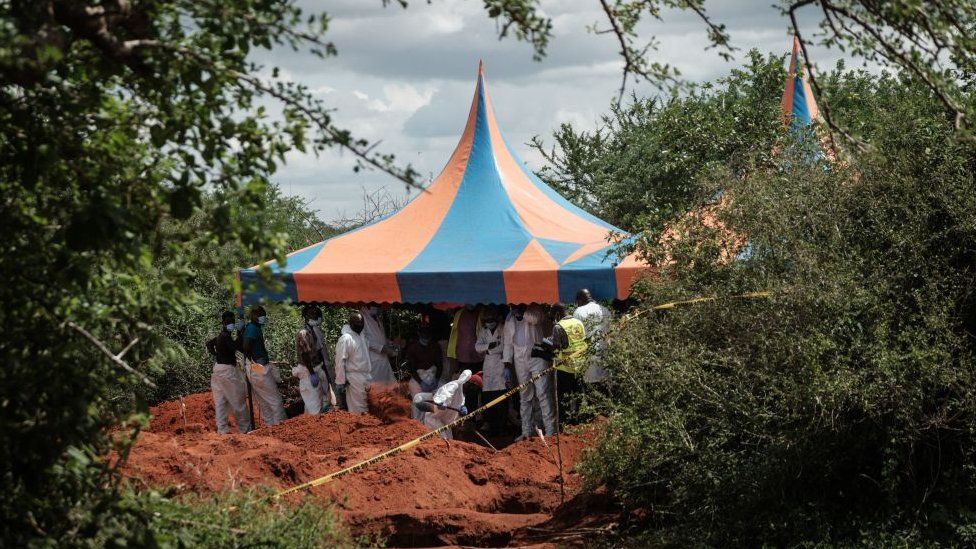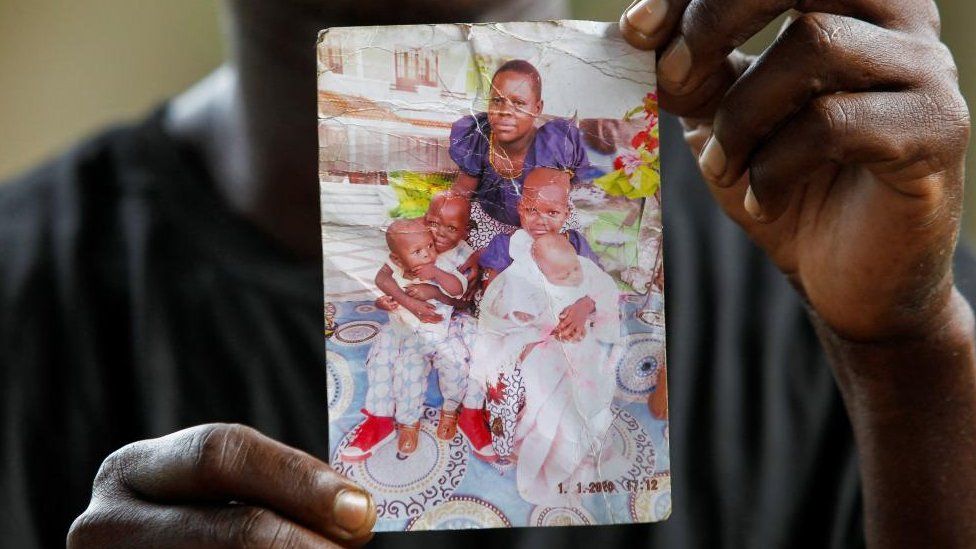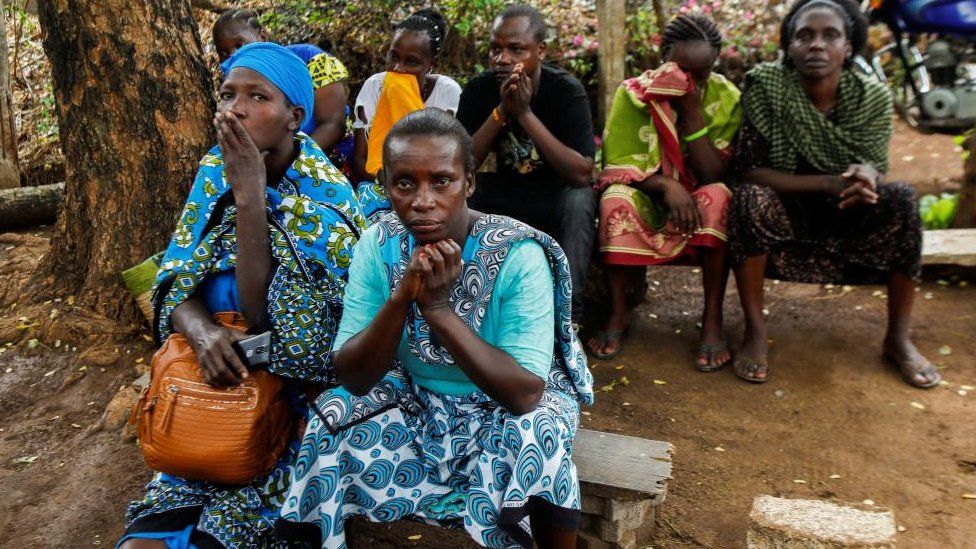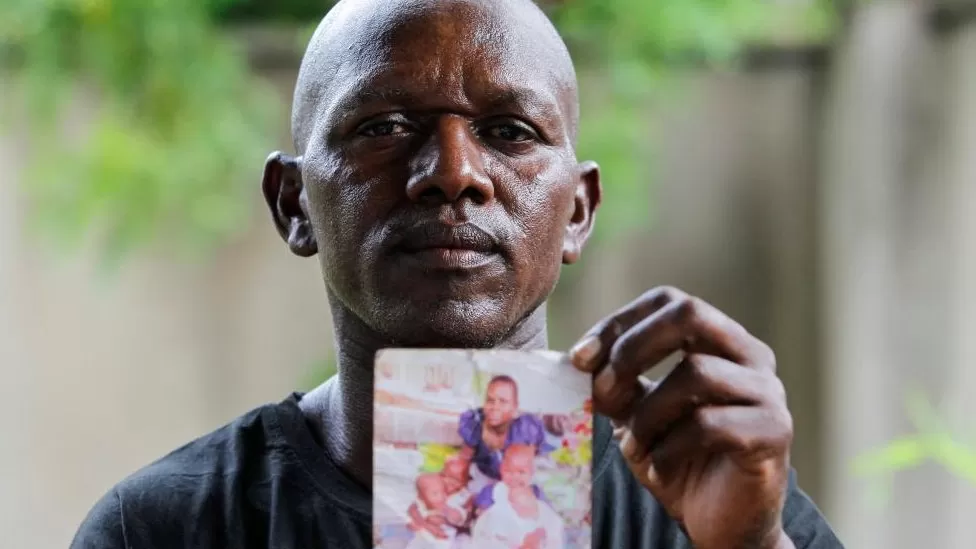Kenyan preacher Paul Nthenge Mackenzie is due to appear in court following the discovery of scores of bodies in a remote forest. He is accused of encouraging followers to starve themselves to death – hundreds of relatives are now wondering what happened to their loved ones.

When the leader of the Good News International Church, Pastor Mackenzie, said the world would end in June 2023, Stephen Mwiti’s wife believed him.
Now, he is certain that she starved to death along with their six children.
The 45-year-old, who makes his living selling mandazi, or fried bread, holds up a crumpled photograph of his wife and four of his children asking if anyone has seen them.
He has been doing this over and over again in the town of Malindi, south-east Kenya, since she disappeared from there last August.
Mr Mwiti has also been to look for them in the Shakahola forest, where members of Pastor Mackenzie’s church had isolated themselves.
His wife, Bahati Joan, was pregnant when she left last year with their children: Hellen Karimi, nine years old, Samuel Kirimil, seven, Jacob Kimathi, three, Lillian Gatumbi, 18 months, and Angelina Gatumbi, seven months.
Mr Mwiti later found out that his wife had given birth to a son, who also died.
She had been an ardent follower of Pastor Mackenzie since 2015 and had first gone to Shakahola in 2021, and then kept coming and going.
After alerting the police numerous times and failed personal attempts to rescue them, he learned recently from other children who had escaped and were being held by Kenyan police, that his own children had died.
“They could identify them from the pictures. They knew their names and where Jacob and Lillian had been buried,” he recounts, fighting back tears.
“I was told not to try to look for my children again. They were all dead. I was too late.”
He believes they were buried in the forest but their bodies have not yet been identified.

Shakahola is a Swahili word that loosely translates as “a place where worries are lifted”.
It is nestled in the expansive 50,000-acre (20,000-hectare) Chakama Ranch in the coastal county of Kilifi.
Pastor Mackenzie is reported to have owned 800 acres of the forest area.
The entrance to the forest, down a rough track off the main road, is a two-hour drive from Malindi, the nearest main town.
Thorn bushes and thickets dot the landscape and make the journey into Shakahola difficult. The heat swelters almost all year round and elephants occasionally roam the area.
The deeper inside, the more cut off it becomes. There is no mobile network, no internet connection.
But it was here that a new Holy Land was established.
The area had been partitioned into villages, each given biblical place names.
Some of Pastor Mackenzie’s followers lived a life of deprivation in Judea. Others holed themselves up in Bethlehem. There was also Nazareth.
“I learned that my wife and children lived and died in Jerusalem,” Mr Mwiti says. But he has not been there since officials began to exhume bodies from marked gravesites.
In the forest, detectives had initially mapped out 65 sites where people were buried. Each had several shallow graves with bodies huddled close to each other.
‘Children were first to die’
Those who exhumed the corpses say the sight of people buried without dignity haunts them. So far 110 people have been confirmed dead, but there are fears the death toll could rise as more of the forest is searched.
Post-mortems still have to be carried out but police and state prosecutors say as well as dying from starvation, some members may have been strangled, suffocated or beaten to death with blunt objects.
Former members of the Good News International Church have said they were forced to starve as part of their adherence to its teachings.
Titus Katana, who managed to escape, says those who tried to leave the cult were branded as traitors and faced violent attacks.
He also suggested there was an order in which people were supposed to die ahead of the end of the world.
“The children were the first to die. Then after the children, they went for the unmarried. Then after, the mothers and the elderly were next in line.”
The church leaders were supposed to be the last to die.
Explaining what drew him to the church, Mr Katana said he thought that Pastor Mackenzie was “charismatic and preached God’s word well”.
An additional attraction was that “Mackenzie was also selling land to his followers. That appealed to me. I bought 15 acres. But when I saw his preaching was odd, I chose to leave.”

Mr Mwiti says he had heard accounts of how his infant son was breast-fed only once. Then he was suffocated to death.
“I heard that when my son was killed, instead of the cult members grieving, they clapped and rejoiced that he had ascended and met Jesus,” he says.
A BBC analysis of Pastor Mackenzie’s sermons on video do not show him directly ordering people to fast, but there are many references to followers sacrificing what they hold dear, including their lives.
At the end of last week, the Kenya Red Cross reported that 410 people, including 227 children, who were thought to have some connection to Pastor Mackenzie’s church, were missing.
Their relatives are now milling around Malindi’s hospital and police station, waiting for news of their loved ones.
Couldn’t persuade mum to leave
Among them is Patrick Ngumbau.
His mother went missing two years ago and he went looking for her in Shakahola, but despite finding her he could not persuade her to leave.
“I asked her if she would accept to come home. She told me she was there for one mission, to find Jesus,” Mr Ngumbau says as he lines up among hundreds waiting for information about their kin.
“I left Shakahola in 2021 very sad because I felt we had already lost our mum.”
He had come from Makueni county – 270km (170 miles) away – to find out more. Relatives of the missing have gathered in Malindi from across the country and even further afield – neighbouring Tanzania and Uganda, as well as Nigeria on the other side of the continent.

Christine Nyanchama came to Malindi from Nyamira, almost 800km away, to look for her sister, her brother-in-law and six other relatives. Her sister’s children – a nephew and niece have already been found dead, but Ms Nyanchama thinks others could still be alive.
“Wherever my sister is, she needs to be helped as fast as possible, before she dies. I understand that she has already fasted for 22 days,” she says referring to the last text message she has received.
Pastor Mackenzie’s teachings online and on TV appeared to touch a chord with some. Among other things, he preached against formal education and modern medicine.
He had said that he had closed down the Good News International Church four years ago after nearly two decades of operation, but his sermons, some still available online, appear to have been recorded after that date.
Some of his ardent followers tore up their education certificates, quit their jobs and refused to vaccinate their children.
Dr Susan Gitau, a counselling psychologist believes that most people who followed Pastor Mackenzie – including university graduates and an elite police officer – were seeking solace, hope, strength and support.

Pastor Mackenzie was arrested in March when two children were found dead in Shakahola. He and their parents were accused of starving and suffocating them before burying them in the forest.
However, he was released for lack of evidence.
He is now back in custody but has not commented on the charges of murder, radicalisation and threatening public safety that he faces.
President William Ruto has promised to set up a commission of inquiry into what happened but the authorities themselves face tough questions. Not least about what took them so long to figure out something was going on.
“There is no excuse for the authorities not to have noticed this,” says Hussein Khalid, the executive director of Haki Africa, the group which raised the alarm about the deaths.
“We are determined and we want to make sure each and every victim gets justice.”
Mr Mwiti blames the government, the police and the local authorities in Malindi for failing to act.
“I am already 45 years old. The minute I heard that they had died, I felt that I had died too.”
He has now given the authorities a sample of his DNA in the hope that his children can be identified. Only then will he be able to mourn.
